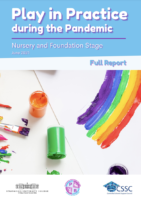PlayBoard NI, Stranmillis University College and the Controlled Schools’ Support Council recently embarked on a collaborative research project to examine the impact of the Covid-19 pandemic on the quality of play within early years classrooms, as well as the impact on children’s engagement, social interaction and emotional well-being.
The research focused on Nursery and Foundation stage (Years 1 and 2 of primary schooling), with the online survey completed by 291 teachers between January and March 2021.
Over half of respondents (58.6%) felt that restrictions impacted negatively on children in terms of their social skills, their levels of independence, their ability to stay on task and overall enhanced anxiety. However, a sizeable minority (41.4%) indicated that children were more independent in terms of self-care routines, more settled in class, happier and more relaxed, and displayed increased levels of resilience and coping skills.
Over two thirds of teachers felt restrictions, alongside intense cleaning regimes, had impacted negatively on the quality of play, resulting in more sterile play and learning spaces.
Speaking ahead of the report launch, Jacqueline O’Loughlin, PlayBoard Chief Executive said: “As with so many areas of society, Covid-19 brought unprecedented challenges to early years education. Teachers at Nursery and Foundation stages were presented with the unenviable task of managing the risks posed by the pandemic while still ensuring a high-quality playful learning experience for children in practice.”
Jacqueline continued: “We are delighted to have been able to work in partnership with Stranmillis University College and the Controlled Schools’ Support Council in order to identify the impact of Covid-19 on play in the early years, and to establish a number of key recommendations for government as we seek to move back to normality.”
The survey highlighted the high level of creativity, improvisation and dedication invested on the part of early years teachers to ensure that young children have, in the main, continued to enjoy a stimulating, playful and nurturing learning experience, despite the many challenges. Almost two thirds of respondents (65.7%) reported making greater use of the outdoors.
Dr Glenda Walsh, Head of Early Years Education at Stranmillis University College, said: “Although this study has been quite small in scale, it has generated some significant findings and recommendations about the importance of play both indoors and out for young children’s learning and development. The last year has certainly shown us that children need to play more than ever.”
Tracey Woods from the Controlled Schools’ Support Council said: “We are delighted to have contributed to this work which highlights the significant work of schools in facilitating playful learning opportunities that positively impact on children’s educational outcomes and their emotional health and well-being”.
Key recommendations contained within the report are aimed at enhancing the capacity of settings to continue to provide a high-quality playful learning experience in practice. These include the following:
Action 1: Need for greater value to be assigned to play in the home and support parents to develop and extend play within the home environment.
Action 2: Need for further guidance on managing play during the pandemic.
Action 3: Need to prioritise outdoor play and outdoor learning in the school environment post pandemic.
Action 4: Need for professional development in the early years.
Action 5: Need for further research into the impact of the Covid-19 crisis on children’s holistic learning and development.
Action 6: Need to prioritise play more fully in practice across Northern Ireland schools and early years settings post pandemic.
Read Play in Practice during the Pandemic – Nursery and Foundation Stage report here





